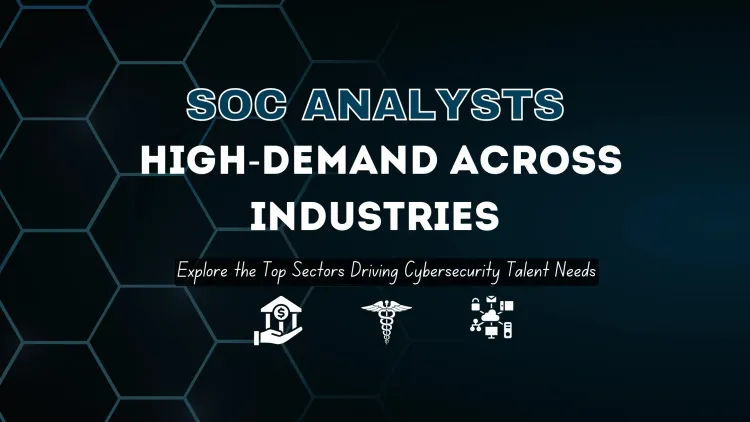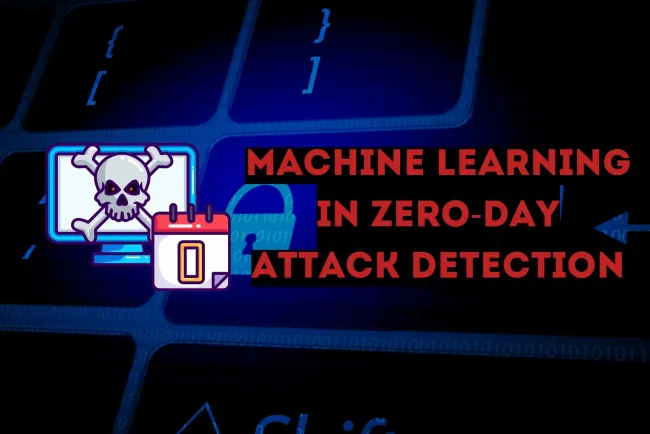Where Are SOC Analysts Needed Most? Top Industries Driving Demand for Cybersecurity Talent
SOC Analysts are essential in protecting organizations across diverse industries from cybersecurity threats. Industries such as financial services, healthcare, government, technology, and manufacturing rely on SOC Analysts to secure critical infrastructure, safeguard sensitive data, and ensure compliance with regulatory standards. Each sector demands specific tools, skills, and certifications, making it important for aspiring SOC Analysts to align their expertise with the industry's requirements.

In today's digital-first world, cybersecurity is no longer optional for organizations. With the rise of cyber threats such as ransomware, phishing, and insider attacks, businesses across industries are prioritizing security measures. This shift has created a surge in demand for SOC Analysts who monitor, detect, and respond to security incidents in real time. But what industries specifically hire SOC Analysts? Let's explore the sectors that depend on these cybersecurity professionals to protect their critical systems and data.
Why SOC Analysts Are Essential Across Industries
Every industry that relies on technology for operations faces cybersecurity risks. SOC Analysts play a pivotal role in ensuring the confidentiality, integrity, and availability of data, which is critical for maintaining trust and compliance with regulations. Their expertise in tools like SIEM (Security Information and Event Management) systems, log analysis, and incident response makes them indispensable in various sectors.
Industries That Hire SOC Analysts
1. Financial Services
The financial sector is one of the most targeted industries for cyberattacks due to the sensitive nature of its data. Banks, credit unions, insurance companies, and investment firms hire SOC Analysts to protect:
- Customer data such as account numbers and personal information.
- Transaction records from fraud and unauthorized access.
- Compliance with regulations like PCI DSS and GDPR.
Example SOC Analyst Tasks in Finance:
- Monitoring for suspicious account activity.
- Investigating fraud alerts flagged by SIEM tools.
- Collaborating with legal teams to meet regulatory standards.
2. Healthcare
Healthcare organizations handle vast amounts of protected health information (PHI), making them a prime target for ransomware attacks. SOC Analysts in healthcare work to:
- Secure electronic health records (EHR) from breaches.
- Protect medical devices connected to networks.
- Ensure compliance with HIPAA and other healthcare regulations.
Key Technologies Used: Endpoint Detection and Response (EDR), Network Traffic Analysis, and Intrusion Detection Systems (IDS).
3. Government and Defense
Government agencies and defense contractors manage classified data and national security systems. SOC Analysts in this sector help:
- Safeguard sensitive government information from nation-state attacks.
- Monitor critical infrastructure such as power grids and communication systems.
- Implement zero-trust security architectures.
Common Tools: Threat Intelligence Platforms (TIP), SIEM solutions like Splunk, and SOAR tools.
4. Technology and IT Services
Tech companies are frequent targets of intellectual property theft and data breaches. SOC Analysts in this field focus on:
- Protecting source code and proprietary algorithms.
- Ensuring the security of cloud-based services.
- Responding to attacks on software supply chains.
Skills in Demand: Cloud security, DevSecOps, and API protection.
5. Retail and E-Commerce
With millions of online transactions happening daily, the retail and e-commerce sector is vulnerable to:
- Credit card fraud.
- Distributed Denial-of-Service (DDoS) attacks.
- Data breaches exposing customer information.
SOC Analysts help:
- Monitor and secure payment processing systems.
- Detect and prevent malware attacks on e-commerce platforms.
6. Energy and Utilities
The energy sector, including power plants, water facilities, and oil companies, faces unique cybersecurity challenges. SOC Analysts work to:
- Prevent cyberattacks on Industrial Control Systems (ICS) and SCADA systems.
- Monitor for cyber-physical threats to critical infrastructure.
- Respond to advanced persistent threats (APTs) targeting the energy grid.
Focus Areas: Operational Technology (OT) security, anomaly detection, and vulnerability management.
7. Education
Educational institutions, from universities to research labs, are increasingly targeted for:
- Student and staff data theft.
- Cyberattacks on research projects and intellectual property.
- Disruptions caused by ransomware.
SOC Analysts in education implement:
- Identity and Access Management (IAM).
- Threat detection for large networks.
8. Media and Entertainment
Media companies and streaming platforms rely on SOC Analysts to:
- Protect digital content from piracy.
- Prevent data leaks of upcoming projects.
- Secure subscription-based platforms against cyberattacks.
9. Manufacturing
Manufacturing companies face growing threats as they adopt smart factory technologies. SOC Analysts in this industry focus on:
- Securing IoT devices and manufacturing systems.
- Preventing downtime caused by malware or ransomware.
- Protecting intellectual property, such as design blueprints.
10. Telecommunications
Telecom providers manage vast networks and are responsible for:
- Ensuring secure communication channels.
- Protecting customer data and services.
- Monitoring for cyberattacks on telecom infrastructure.
SOC Analysts work closely with network engineers to maintain high availability and secure operations.
A Comparative Table of Industries Hiring SOC Analysts
| Industry | Primary Focus | Key Tools/Skills | Compliance Standards |
|---|---|---|---|
| Financial Services | Fraud prevention, compliance | SIEM, Firewalls | PCI DSS, GDPR |
| Healthcare | Protecting PHI, ransomware prevention | EDR, Network Traffic Analysis | HIPAA |
| Government & Defense | National security, critical infrastructure | Threat Intelligence, SOAR tools | FISMA, NIST |
| Technology | IP protection, cloud security | Cloud Security Tools, DevSecOps | ISO/IEC 27001 |
| Retail & E-Commerce | Payment security, DDoS protection | Malware Analysis, IDS/IPS | PCI DSS |
| Energy & Utilities | ICS security, APT detection | Anomaly Detection, OT Security | NERC CIP |
| Education | Data theft prevention, network monitoring | IAM, Threat Detection | FERPA |
| Media & Entertainment | Digital content protection, piracy prevention | DRM Tools, Data Encryption | N/A |
| Manufacturing | IoT security, malware prevention | IoT Security, Vulnerability Scanners | ISA/IEC 62443 |
| Telecommunications | Network security, data protection | Firewalls, Secure Communication Protocols | ITU-T Recommendations |
Conclusion
SOC Analysts are in demand across a variety of industries due to the universal need for cybersecurity. From financial services to energy, these professionals are critical in protecting sensitive data and ensuring operational continuity. Aspiring SOC Analysts should explore the industries that align with their interests and build the necessary skills and certifications to meet the specific demands of their chosen field.
By understanding the tools, technologies, and compliance standards of these industries, you can position yourself as a valuable asset in the dynamic world of cybersecurity.
FAQs
-
What industries hire SOC Analysts?
SOC Analysts are hired across industries like financial services, healthcare, government, technology, manufacturing, and energy. -
Why is the financial services industry a major employer for SOC Analysts?
Financial services deal with sensitive customer data and financial transactions, making cybersecurity crucial to prevent fraud and breaches. -
What skills do SOC Analysts need in the healthcare sector?
SOC Analysts in healthcare need expertise in protecting PHI, securing medical devices, and ensuring HIPAA compliance. -
How do SOC Analysts contribute to government and defense?
They safeguard classified data, monitor critical infrastructure, and prevent cyberattacks from nation-state actors. -
What cybersecurity challenges exist in manufacturing?
Manufacturing faces IoT device security, malware prevention, and protection of intellectual property like design blueprints. -
What tools are commonly used by SOC Analysts in telecommunications?
Firewalls, secure communication protocols, and SIEM tools are key in securing telecom networks and data. -
What is the role of SOC Analysts in the energy sector?
They focus on ICS security, anomaly detection, and APT prevention to protect critical energy infrastructure. -
Are SOC Analysts needed in education?
Yes, they help secure student and staff data, protect intellectual property, and prevent ransomware attacks on networks. -
What certifications are valuable for SOC Analysts across industries?
Certifications like CompTIA Security+, CEH, CISSP, and GIAC are widely recognized and valuable in all industries. -
How can a beginner SOC Analyst choose the right industry?
Beginners should assess their interests, research industry-specific challenges, and align their skills with the industry's demands.












![Top 10 Ethical Hackers in the World [2025]](https://www.webasha.com/blog/uploads/images/202408/image_100x75_66c2f983c207b.webp)

![[2025] Top 100+ VAPT Interview Questions and Answers](https://www.webasha.com/blog/uploads/images/image_100x75_6512b1e4b64f7.jpg)









